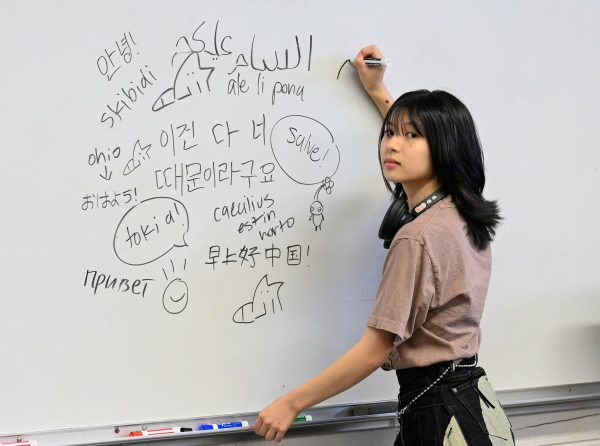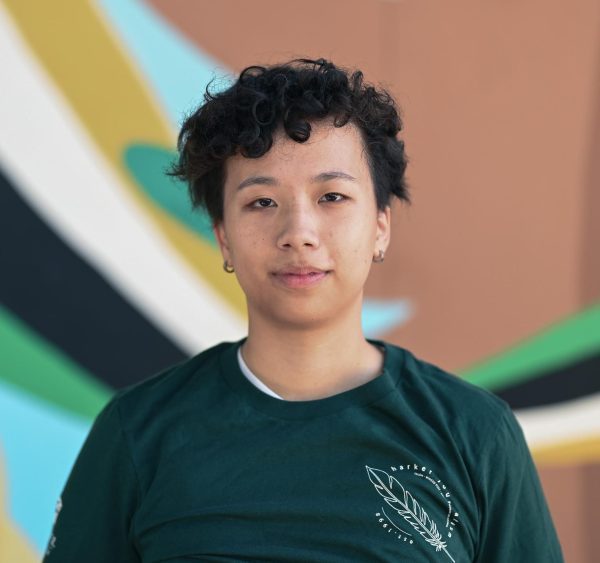
Pushing hair out of their eyes while scribbling some quick notes about the last linguistics lecture, senior Audrey Cheng walks into a room with a smiling instructor speaking Lithuanian. This is the Summer Linguistic Institute for Youth Scholars (SLIYS). Though Audrey has never explored Lithuanian before, immediately they begin to throw question and ask for sentences from the instructor, unraveling the relationships within the language and exploring the intricacies of Lithuanian verb tenses.
Audrey’s first exposure to a language other than English was Mandarin, a language they initially resisted learning. However, they began to truly appreciate the intricacies of linguistics in sixth grade when they began learning Latin. They realized that Latin was built on understanding the various components of the language and piecing together the parts, similar to poetry. Later during Club Fair, the logic puzzles at the Harker Language and Linguistics Club fascinated Audrey, who recognized the patterns that they often saw while solving puzzles.
“Once you stop looking at each character as something to memorize and once you start to think about how the language is composed, the more everything makes sense,” Audrey said. “I learned to approach language from an angle that’s not pure memorization and understand the pieces then put them together. I like thinking of things more as connections to each other because then you can reconstruct the whole, even if you don’t know everything. Part of the fun is reconstructing your own sense of what it means.”
Fueled by their discovery of these puzzles, Audrey continued to expose themself to new languages such as Japanese, Korean and Arabic and further study the field of linguistics. The idea that certain foundational principles of linguistics can be mostly applied to all languages especially intrigued them. They began to ponder about the transfer of information between human beings through our languages.
“As I learn more about linguistics, the fundamental principles that you learn about give you the tools to help you learn languages better,” Audrey said. “Once you broaden your scope, outside of romance languages, or even languages descended from Middle Chinese, you start seeing that there are so many ways that humans can communicate information. Yet a lot of these rules still govern all of us.”
Audrey’s excitement for linguistics led them to discover constructed languages, languages developed by humans rather than organically through time. They especially remember the constructed language that they made with a friend utilizing common slang terms. The language-making process helped them fully break down the components that constructed a language. Close friend senior Sophia Zhu remembers spending afternoons listening to Audrey examine something new they learned about a language.
“They are genuinely very hardworking and very passionate,” Sophia said. “I’ll see them talking about linguistics, for example, and I literally see the light in their eyes. Sometimes I’m working on computer science, because we’ve done a few of those post-AP classes with Dr. Nelson, and they come up with creative methods of solving problems. I admire them for being someone who’s so chill and down to earth to talk to.”
Audrey’s hardworking and meticulous approach also shines within the classroom. Since sophomore year, Audrey studied multiple computer science topics with computer science department chair Eric Nelson, who speaks of their growth in confidence and maturity in his classes.
“One of the big things I noticed about Audrey is that they’re very respectful of other people’s times, impressions and feelings.” Dr. Nelson said. “They have a strong sense of empathy that goes with it. Their personality comes across as someone who cares about you and your time and is considerate of it, which I find refreshing. I admire their perseverance and their attention to detail going beyond the actual requirement and taking some risks.”
As they continued to explore linguistics and computer science, Audrey discovered an intersection between the two fields. They are particularly interested in preserving languages on the brink of extinction through Natural Language Processing, a machine learning technique that processes human languages, and using a machine to pass down the languages rather than people. One project they completed focused on building an NLP model to apply the limited public data for a dying language to uncover new linguistic relationships.
“You wouldn’t think that the problem of preserving dead languages is always apparent, but it’s one that computers developing NLP technology is our best solution for,” Audrey said. “There’s just no way that we as a society could possibly do all of that work ourselves, but maybe in the future if we’re able to develop the proper technology that could record it for us and, therefore, preserve it for eternity.”
Linguistics has given Audrey a greater appreciation for the connections that people make with each other and with their environment. They value genuine connections and seek directness, honesty and open conversations. Close friend junior Serena Zu, who met Audrey in sixth grade, first bonded with them online over television shows and video games. Now, they see Audrey not only as a close friend but as a mentor figure.
“Audrey is very tenacious.” Serena said. “Once they set their mind to something, work really hard to accomplish it, even if they don’t say they are outwardly. I think that’s really admirable.”
Growing from the child who dreaded Chinese school to building natural language processing technology to preserve languages lost to time, over the course of their linguistics journey, Audrey has learned the value of stepping out of their comfort zone. They approach all of their projects with an open mind and meticulous attention that allows them to bring forward their best work.
“It really helps to open your perspective to more topics,” Audrey said. “Especially when you’re young, you tend to have a lot of prejudices against certain things that you don’t like especially if someone is forcing you to do it. As I grew older and I started trying to explore things on my own, I realized that a lot of things, including learning languages, is not as bad as it seems. I think the beauty of language is that anyone who’s interested enough to give it some time can do it. Language is such a fundamental aspect of everything and whatever you want to do with it, there’s infinite possibilities.”




![LALC Vice President of External Affairs Raeanne Li (11) explains the International Phonetic Alphabet to attendees. "We decided to have more fun topics this year instead of just talking about the same things every year so our older members can also [enjoy],” Raeanne said.](https://harkeraquila.com/wp-content/uploads/2025/10/DSC_4627-1200x795.jpg)


















![“[Building nerf blasters] became this outlet of creativity for me that hasn't been matched by anything else. The process [of] making a build complete to your desire is such a painstakingly difficult process, but I've had to learn from [the skills needed from] soldering to proper painting. There's so many different options for everything, if you think about it, it exists. The best part is [that] if it doesn't exist, you can build it yourself," Ishaan Parate said.](https://harkeraquila.com/wp-content/uploads/2022/08/DSC_8149-900x604.jpg)




![“When I came into high school, I was ready to be a follower. But DECA was a game changer for me. It helped me overcome my fear of public speaking, and it's played such a major role in who I've become today. To be able to successfully lead a chapter of 150 students, an officer team and be one of the upperclassmen I once really admired is something I'm [really] proud of,” Anvitha Tummala ('21) said.](https://harkeraquila.com/wp-content/uploads/2021/07/Screen-Shot-2021-07-25-at-9.50.05-AM-900x594.png)







![“I think getting up in the morning and having a sense of purpose [is exciting]. I think without a certain amount of drive, life is kind of obsolete and mundane, and I think having that every single day is what makes each day unique and kind of makes life exciting,” Neymika Jain (12) said.](https://harkeraquila.com/wp-content/uploads/2017/06/Screen-Shot-2017-06-03-at-4.54.16-PM.png)








![“My slogan is ‘slow feet, don’t eat, and I’m hungry.’ You need to run fast to get where you are–you aren't going to get those championships if you aren't fast,” Angel Cervantes (12) said. “I want to do well in school on my tests and in track and win championships for my team. I live by that, [and] I can do that anywhere: in the classroom or on the field.”](https://harkeraquila.com/wp-content/uploads/2018/06/DSC5146-900x601.jpg)
![“[Volleyball has] taught me how to fall correctly, and another thing it taught is that you don’t have to be the best at something to be good at it. If you just hit the ball in a smart way, then it still scores points and you’re good at it. You could be a background player and still make a much bigger impact on the team than you would think,” Anya Gert (’20) said.](https://harkeraquila.com/wp-content/uploads/2020/06/AnnaGert_JinTuan_HoHPhotoEdited-600x900.jpeg)

![“I'm not nearly there yet, but [my confidence has] definitely been getting better since I was pretty shy and timid coming into Harker my freshman year. I know that there's a lot of people that are really confident in what they do, and I really admire them. Everyone's so driven and that has really pushed me to kind of try to find my own place in high school and be more confident,” Alyssa Huang (’20) said.](https://harkeraquila.com/wp-content/uploads/2020/06/AlyssaHuang_EmilyChen_HoHPhoto-900x749.jpeg)



